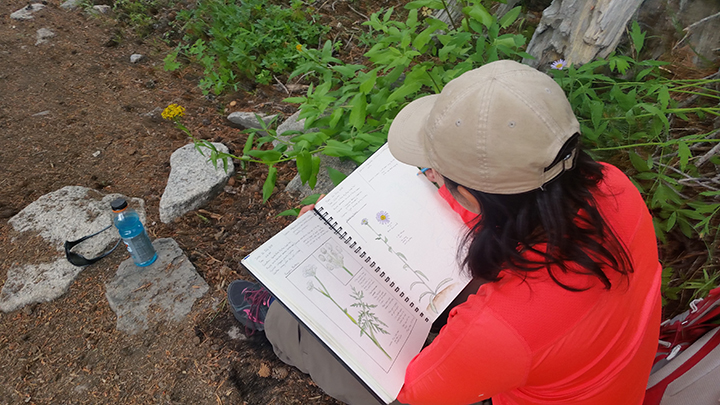Department of Biology

Biology graduate student completes study on invasive nutria
Conservation is very important to Abby Dziegiel, a graduate student earning an M.S.
in Biology at Fresno State. She recently completed the U.S. Fish and Wildlife Service
Directorate Fellows Program, despite the COVID-19 crisis.
Her Directorate Fellows Program position at the San Luis National Wildlife Refuge
focused on a rising issue in California – invasive nutria.
"This semi-aquatic rodent from South America destroys native wetlands by decimating
emergent vegetation, and its burrowing habits threaten the water infrastructure that
we rely on for urban and agricultural use," she said.
The initial plan for her summer included camera trapping and monitoring for nutria,
but the shelter-in-place restrictions meant she had to adjust the project into something
completely telework-friendly.
Over the course of 11 weeks, she helped write a comprehensive report about nutria,
with an emphasis on the past, current, and future situation at the refuge. She poured
over thousands of images from camera traps that were set up to help monitor wetland
habitat for signs of nutria. She also helped organize, process, and analyze nutria
capture and necropsy data for the report.
"I also got to meet other DFP students and USFW employees from around the nation –
online, of course," she said.
Throughout the program she learned about different career paths in USFWS, and at the
end of her internship she presented her project to regional USFWS leaders.
Because the DFP program also works hand-in-hand with non-profit organizations, her
internship included a collaboration with the Hispanic Access Foundation (HAF), which
provided a second line of communication and assistance. She also wrote a few blogs
about her internship and published them on the HAF website.
Even though she loved science, getting to this point was a bit of a journey, said
Dziegiel.
After Dziegiel graduated from UC Merced with a degree in Ecology and Evolutionary
Biology, she wasn’t sure what kind of career path she should follow. She spent a few
years volunteering and working a variety of jobs, which varied from learning how to
build nest boxes to working as a field technician for greenhouse gas meadow research.
She also taught as a substitute teacher to see if she might want to be a science teacher.
"This laundry list of experiences may seem chaotic, and at times it certainly felt
that way," she said. "However, I eventually realized that science and conservation
tied them all together, and that I wanted to focus in on those core elements. I decided
that I needed to go back to school. No matter which path I took afterwards, I wanted
the competitive edge and skillset that a master’s degree could provide, and I wanted
to study biology."
She chose to apply to Fresno State because she wanted to work on research related
to local conservation issues, and she felt that Fresno State shared her values regarding
community involvement and service.
In the Biology graduate program at Fresno State, Dziegiel thrived under Dr. Steve Blumenshine's mentorship.
"While I may have entered graduate school with a diverse background, I was not that
comfortable with data analysis or experimental design," she said. "Dr. Blumenshine
has really helped me to build these skills, and to understand why they are so fundamentally
important in science."
Dr. Blumenshine also regularly directs her (and the rest of the lab group) to a wide
variety of resources – statistics help, funding opportunities, job opportunities,
and more.
"For example," Dziegiel said, "the spring before my first semester at Fresno State,
Dr. Blumenshine sent out an email regarding a job opening at the San Luis National
Wildlife Refuge Complex with USFWS. I applied and landed a summer job as a Youth Conservation
Corps (YCC) crew leader in 2019."
Dziegiel says the Biology Department at Fresno State genuinely cares about students.
"The faculty and staff truly want to prepare students for the next step of their journey,
whether they hope to continue in academia or pursue a non-academic career," she said.
"Each of my professors has been very accessible, and they are always excited to share
their field of study with anyone who is curious."
The Directorate Fellowship Program grants a period of noncompetitive hiring status
to students who successfully complete the program. Dziegiel plans to take advantage
of this once she graduates from Fresno State.
"I plan to contribute any and all of my skills to helping solve the conservation issues
of today and tomorrow, and I believe my time at Fresno State has played an irreplaceable
role in building those skills," she said.
